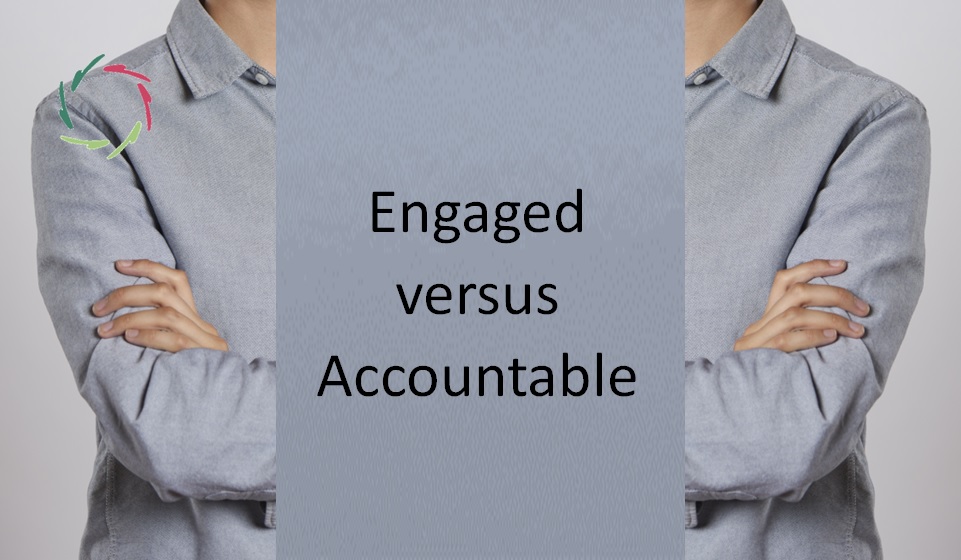Engaged versus Accountable

In theories about which of both is most effective, the pendulum swings over many years from the one to the other to the one — usually without much depth involved.
Terminology
- Engaged: emotionally involved or committed.
- Accountable: holding oneself or being held responsible. This is related to the ‘locus of control’ ― putting responsibility for doings and happenings outside, inside, or profoundly inside oneself.
Unfortunately, much depth is crucially lacking in several places.
Maybe especially in conceptual modern human-oriented science, where it is nevertheless most – deeply – needed. Rationality and human depth ought to be friends.
Unfortunately, this lack of depth leads to a meaning crisis that engulfs large parts of the world, getting significantly worse every year. I see as main reason for this the discrepancy between technological and human progress. That conundrum will not be solved by superficially making people ‘accountable.’ Even more, doing so quickly becomes part of the problem. Meanwhile, technological progress is not a bad thing. Let’s use it for people, not against them. So, what is needed?
Of course, depth is not the most accessible concept. Yet without it, one may want to realize many three-dimensional things in a two-dimensional way. Effective? Towards what?
Superficial engagement
This is about over-dramatizing, demanding excessive attention, (c)overt manipulation, ducking from responsibility, weakness instead of gentleness.
Superficial engagement is fickle as mere-ego — better therefore not to call it engagement. Emotional contagion (in the landscape of empathy) might be a more appropriate concept to work with in contrast to genuine, deep engagement, which is simply called engagement in the rest of this text.
Without the third dimension, things may backfire.
One then thinks to engage people while driving them away. Unfortunately, one may conclude after a while that ‘engagement‘ principally doesn’t work — the more so if the situation seems to clear up after striving less for (this kind of) engagement.
You got it: Here comes a new swing of the pendulum. This can go on and on because, in two dimensions, nothing related to human complexity really works. As a result, the goal itself of HR (human resource departments) lies under serious scrutiny. Meanwhile, the new whatever may temporarily seem to work because expectations work — for a while, even after repeatedly having been ‘new.’
As a physician and cognitive scientist, I know how well expectation works, for instance, in the placebo phenomenon. Notoriously, a new placebo-rife medication generally shows a honeymoon period after which the magic (and effectiveness) drops. Ask any insightful physician.
New fads can keep working as long as they keep up the expectation.
In the meantime, lack of deep engagement leads to burnout.
This doesn’t put guilt anywhere. Burnout is the object of joint responsibility, no guilt.
The negative influence of low engagement may be less apparent because it plays at longer term. The long and winding road of burnout may thus affect companies (and societies) profoundly in less obvious ways. ‘Successful’ short- to mid-term solutions are not necessarily the best.
Burnout is not a symptom of people’s laziness or ethical shortcomings. It is a symptom of the above-mentioned discrepancy and meaning crisis.
Naturally, people loathe jobs and love to work. So, what is needed?
Engagement drives results (and prevents burnout) if it’s the right engagement.
Such engagement is rooted pretty deeply/strongly. Without solid roots comes a storm and gone is the tree. Conversely, look at the results. If they don’t show and keep showing, or trees are falling, the engagement may not be strong.
So the question is, what leads to strong engagement?
Does accountability do the trick?
Of course, accountability may look purely at numbers and treat people as tools. We’re not even talking about that. Facts are facts. One fact is that people are natural organisms, not mechanisms.
Feeling accountable, too, may go superficial or deep. The former option can be more readily seen as a conscious choice, relieving the burden from who might otherwise be seen as responsible in leadership. As you may guess, I’m rather into deep accountability, where conscious choice is less evident, and accountability drifts to engagement.
The more genuine the engagement/accountability is, the better it may grow. People become more self-accountable/self-engaged from the inside out.
Whence come the results of deep engagement?
One may look at the same source as with deep motivation.
Yes, ‘deep’ again, as in many overlaps of broad mental-neuronal pattern (MNPs) in the brain ― with each other and with outside patterns, thereby putting things into motion.
The search is for how to encourage these overlaps ― preferably without any manipulation.
So, what may concretely lead people to high accountability/engagement?
One element is already present in this question, where you find ‘lead,’ which indicates leadership. I dare say, Open Leadership, pointing to profoundly inside, in overlap of MNPs, then to profoundly outside. Open Leadership is a joint effort to the highest degree, as is anything that leads to genuine engagement.
Still, this doesn’t diminish the leaders’ job — for instance, in being the prime source of jointness. Open Leadership makes people feel accountable/engaged from the inside out, where it is most effective. In such cases, people’s trust in their leaders is earned by the latter. The Open Leader’s role is not to make people (superficially) happy but meaningful ― which is, of course, the true source of happiness.
Eventually, the goal of it all is a continual striving for true excellence.


